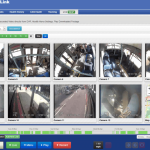Coach and bus operators must be proactive in taking action against the issue of sexism and misogyny in all its forms — including social media.
Those are the comments of Liv Rayment, Operations Team Member at R&J Coaches (pictured, below), who has concerns that negative behaviour towards women prevails across both social media and within the industry itself, and risks turning away potential drivers.
Culture problem?
While Ms Rayment, who joined the industry in 2019, puts many events down to isolated incidents, she reveals that she took the decision to approach routeone after witnessing a culture of misogyny prevalent among some male drivers on social media, where deeply offensive comments are regularly posted about women online.
“Some of the clients that we have for international summer schools employ staff who travel on those coaches. Some of them can be university age, and many of the comments made imply that favouritism would be given to women wearing certain articles of clothing.
“If I was an outsider to the industry and I saw such things being posted, you would naturally assume that is how you would be treated — that these drivers would jest about you in a horrible manner. Those comments are enough to stop someone pursuing a career in this industry.”

Monitoring needed?
Ostensibly, the block function on social media sites should provide some protection (although Ms Rayment reveals that, on some platforms, it only restricts messaging and does not prevent the blocked party from still seeing the user’s content), but there is little real regulation of the type of behaviour highlighted. Ms Rayment thus argues it should fall more on management to be mindful of the type of attitude and behaviour their drivers are displaying online.
“We discuss this at [R&J Coaches] and management agree that it is inappropriate. They are actively trying to encourage diversity in the workplace and have procedures in place for if incidents were to occur. I hope that other companies are doing or will do the same to help with counteracting these attitudes.
“It’s possible to trace many of these users to where they work with their social media accounts. I would be interested to know from their own management what they would do about that behaviour.”
Wider safety
Ms Rayment’s comments form part of broader concerns about women’s safety in the industry, and a desire to see more robust requirements for CCTV to protect both drivers and passengers.
She reveals that there are many scenarios where both men and women might feel vulnerable when driving a coach, such as on late night rail replacement. “A lot of operators are running fleets over 15 years old and there is little guarantee that CCTV on many of those vehicles is working,” she says. “It’s very hard for drivers to police situations, and without hard evidence, if an incident does happen, it is often reliant on a victim coming forward.
“CCTV is one of the few things we should be able to rely on — local authorities are able to part-fund zero-emission fleets, why can there not be grants for CCTV to be fitted in vehicles to ensure passengers on the whole network feel safe?”
Louise Cheeseman, Chair and founder of Women in Bus and Coach (WiBC), acknowledges Ms Rayment’s concerns and echoes calls for a proactive
approach.
“No-one should be made to feel unsafe or disrespected when in their workplace. It is imperative that outdated attitudes and behaviours are challenged at every level,” she says. “It is vital that operators and managers adopt a proactive stance in tackling sexism, whether it appears on social media, in workplace comments, or through discriminatory assumptions about a woman’s ability to drive.
“We welcome calls for the introduction of robust CCTV coverage on all vehicles, including older fleets, to help safeguard both drivers and passengers. Safety in the workplace is not negotiable, and a zero-tolerance approach towards harassment and intimidation is essential.
“WiBC is committed to supporting all women who encounter these issues. We encourage anyone facing sexist remarks or feeling threatened to speak out and seek help – be it through human resources, trade unions or organisations like ours. Effective policies, coupled with clear leadership from the top, are paramount if we are to create an inclusive environment that respects and celebrates the contributions of all staff. By working together, we can ensure that no one’s gender becomes a barrier to their success in this vital industry.”
‘An uneven fight’
Ms Rayment warns the problem is likely to persist until better representation is achieved. “Women are still a minority in this industry and until we see the proportion of young and female drivers coming through even out attitudes, it will remain an uneven fight. Having an organisation or support group for young women fresh into the industry would help begin that movement to uniting our voices.”



























